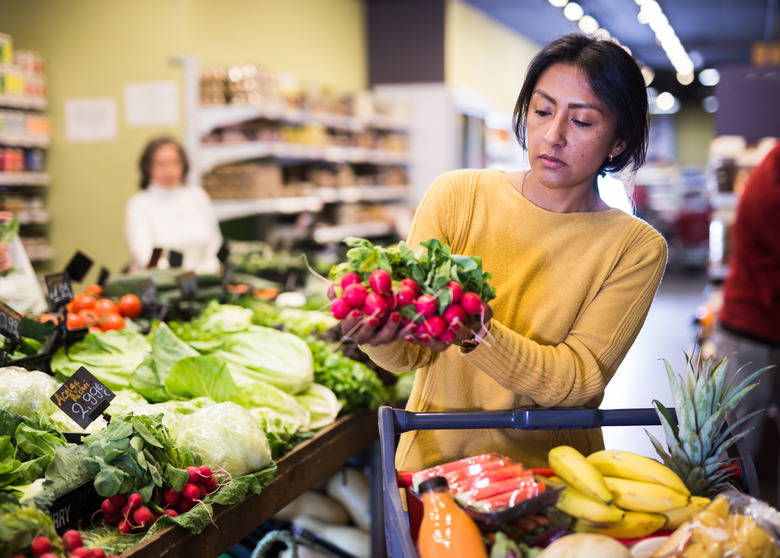This Is The Produce With The Most Pesticides On It In 2023
Strawberries, peaches, apples, grapes, plums ... what do all of these foods have in common? Aside from being beloved produce favorites, they also share a less favorable commonality: They're all on the Environmental Working Group's 2023 list of produce with the most pesticides.
Each year since 2004, the EWG releases a Shopper's Guide to Pesticides in Produce, in which they reveal an updated list of produce with the most and least amount of pesticides. These findings are based on tests conducted by the Department of Agriculture and the Food and Drug Administration, in which they analyze over 46,000 produce samples. The samples are tested after they've been prepared to be eaten, thoroughly washed, and sometimes peeled, and yet many still contain pesticide residue.
EWG's 2023 Shopper's Guide to Pesticides in Produce reports that nearly 75% of non-organic fresh produce sold in the United States contains the residue of potentially harmful pesticides. Included in this annual guide is the EWG's "Dirty Dozen," which lists the top 12 types of fruits and vegetables that are most contaminated with pesticides. The 2023 list is as follows:
- Strawberries
- Spinach
- Kale, collard, and mustard greens
- Peaches
- Pears
- Nectarines
- Apples
- Grapes
- Bell and hot peppers
- Cherries
- Blueberries
- Green beans
The guide also includes produce on the other side of the contamination spectrum, in a list called the "Clean Fifteen" that outlines the fruits and vegetables with the least amount of pesticides detected. The 2023 Clean Fifteen:
- Avocados
- Sweet corn
- Pineapple
- Onions
- Papaya
- Sweet peas (frozen)
- Asparagus
- Honeydew melon
- Kiwi
- Cabbage
- Mushrooms
- Mangoes
- Sweet potatoes
- Watermelon
- Carrots
So what are grocery shoppers to do with this information? The EWG recommends choosing organic produce whenever possible. "Standards for growing organic produce ban the use of synthetic pesticides, which is a simple way to identify items likely to have no or minimal traces of those substances," the EWG explains on its site. "Consumption of organically produced food reduces pesticide exposure and is linked to a variety of health benefits, according to multiple studies, especially findings from a large study in France [referring to the French BioNutriNet Project]."
Generally being more mindful about the produce you and your family are consuming, and using resources like the EWG's annual Shopper's Guide, is the healthiest habit to begin practicing.
